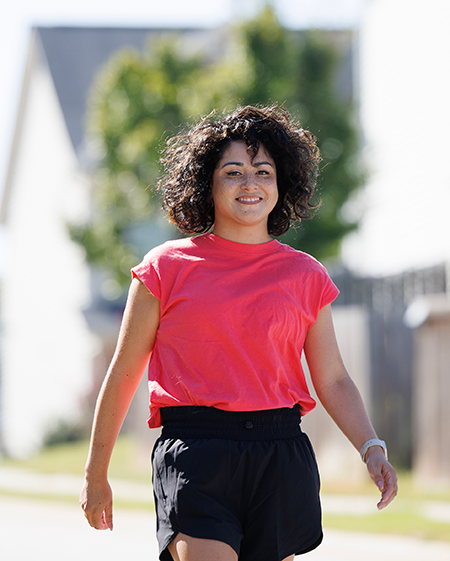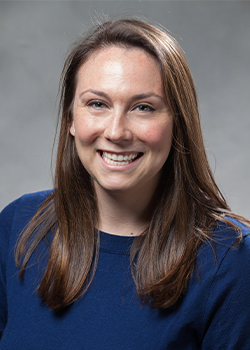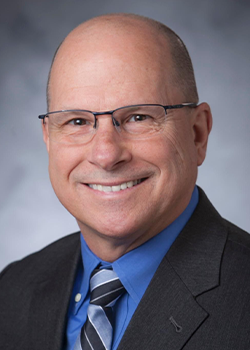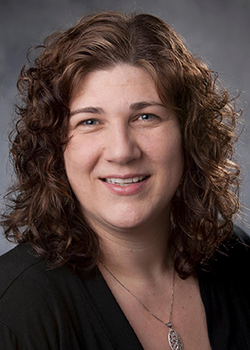
Helping Young Adults Move Forward After Cancer
At age 34, Iris Bugbee, of Fuquay-Varina, NC, faced more than a breast cancer diagnosis. She juggled full-time work as a speech-language pathologist while raising her two-year-old daughter, Mila. After taking six weeks off for surgery, she continued working through cancer treatments, adjusting her hours but never stepping away.
She fit in radiation appointments at Duke Women’s Cancer Care Raleigh between her patient sessions. “I’d go to work, travel to Raleigh, and then come back and see the rest of my patients,” she said. Balancing treatment, her patients, and parenting, “I didn’t think a whole lot about my own treatment and diagnosis.”

A year after her mastectomy, a nurse invited her to join a clinical trial testing a structured support program for young adult cancer survivors. Bugbee agreed, hoping to regain strength and she saw it as a good source of motivation. Before surgery, she exercised regularly, but since then, she had struggled with cording syndrome which limited mobility in her right arm and made everyday tasks like picking up her daughter or typing at work challenging.
The program guided her through goal setting, gradual strength-building, and self-compassion. “That’s when I started walking, stretching, and slowly rebuilding,” she said.
Beyond physical recovery, the sessions helped her process her experience. The online support group felt more like conversations with peers than a mandatory class, and psychologists who ran the program made sharing easier.
“It was reassuring to hear from other cancer survivors who are in the middle of this part of their life – raising a family or in the middle of their careers,” Bugbee said. “Hearing everyone’s experiences and their challenges made me feel like, ‘Okay, yeah, I’m not the only one.’ ”
A Life Interrupted
Being diagnosed with cancer and going through treatment isn’t easy for anyone. For those diagnosed as young adults, ages 18-39, cancer brings unique challenges.

“This is a time of transition,” said Caroline Dorfman, PhD, a clinical psychologist at the Duke Cancer Institute and an associate professor in psychiatry and behavioral sciences. Many young adults are focused on milestones—graduation, career growth, marriage, parenthood—when a cancer diagnosis suddenly halts their momentum.
Even after treatment, life doesn’t suddenly switch back to normal. Physical symptoms like pain and fatigue can linger and emotional distress is common in the post-treatment period. Frequent follow-ups add financial and logistical burdens while serving as constant reminders of illness.
“Sometimes they just want the cancer behind them, and to get back to doing what matters to them,” Dorfman said. “The trouble is that when they are in the midst of treatment, they are just trying to get through it, and they don’t stop to process the experience.”
To support young adults in this vulnerable phase, Dorfman designed a 10-week program to help them navigate post-treatment challenges and successfully manage their new lives as cancer survivors.
Listening to Survivors
Dorfman’s interest in the psychological impact of cancer began early. When her mother was diagnosed with breast cancer during Dorfman’s middle school years, she observed how different family members coped. Later, in graduate school, she focused on behavioral interventions to improve cancer patients’ emotional well-being.

As a clinical psychology intern at Duke, she saw a gap in support for young adults: it became apparent that they could benefit from a structured system of post-treatment support tailored to their stage of life.
So, she decided to design and test a program to do that.
Dorfman’s post-treatment curriculum teaches strategies to manage pain, fatigue, and emotional distress through relaxation techniques, goal-setting, strategies to improve self-talk, home-based exercise, and values-driven decision-making. It also includes strategies for improved conversations with family, friends, employers, and health care providers.
“We can educate patients on how normal it is to have continued symptom burden and how normal it is to feel like they are not achieving goals in the way they would like,” she said. “And we can provide them with tools to help them move forward on the important goals they have for their lives while navigating symptoms.”
The content is delivered through eight 90-minute virtual group sessions, supplemented by written materials and a mobile app.
Dorfman secured a grant from the National Institutes of Health in 2019 to pilot the project with mentorship from Kevin Oeffinger, MD, professor in the Department of Medicine, and Rebecca Shelby, PhD, associate professor in the Department of Psychiatry and Behavioral Sciences.

Oeffinger, a family physician who has worked with young adult cancer survivors for 35 years, said post-treatment symptoms in this group have been overlooked. “Caroline is trying to fill that gap, both in her clinical program and her research program. What she is doing is incredibly important.”
Before designing the program, Dorfman interviewed young adult survivors and oncologists to identify key post-treatment struggles. Pain, fatigue, and emotional distress topped the list.
Survivors also wanted guidance on communicating their needs—whether to family, employers, or doctors. Many had never navigated the healthcare system independently before their diagnosis.
“Some had never needed primary care before cancer,” Oeffinger said. “Now they suddenly face new short- and long-term health risks and need to engage with the health care system.”
Young survivors also sought advice on requesting workplace or academic accommodations. In response, Dorfman built assertive communication training into the program. “Sometimes people in their social network said things that were really unhelpful,” Dorfman said. Survivors learned how to identify supportive people in their network and how to effectively ask for what they need.
Building on What Works
The pilot program enrolled 61 participants, and the results were encouraging. Not only did participants like the program, and would recommend it to other people, but their symptoms become less burdensome.
An important feature of Dorfman’s program is the delivery as a package of sessions, each of which builds on the one before. At the Duke Cancer Center, young adult cancer survivors, like all cancer survivors, already have a wealth of supports in place, from support groups to individual counseling. But these resources are offered a la carte and on-demand; it’s up to each patient to pick and choose.
Dorfman’s program stands out because it’s structured as a curriculum that covers a range of skills and topics unveiled over several weeks. “What’s unique is the packaging,” she said. “These strategies in this combination have not been evaluated before.”
Now, with a five-year NIH grant, she’s expanding the program to 250 participants. Based on the pilot feedback, Dorfman plans to tweak a few details -- reducing the number of sessions to six, shifting to one-on-one formats for flexibility, and adding more strategies to help participants gain confidence in taking an active role in their ongoing medical care.
If the program proves to be effective in this larger group, Dorfman hopes it will be used regularly as part of the Duke Cancer Patient Support Program – and beyond.
Mary-Russell Roberson is a freelance writer in Durham.
Angela Spivey is a senior science writer and managing editor in the Office of Strategic Communications at the Duke University School of Medicine.
Photography by Eamon Queeney, assistant director, multimedia & creative in the Office of Strategic Communications.
